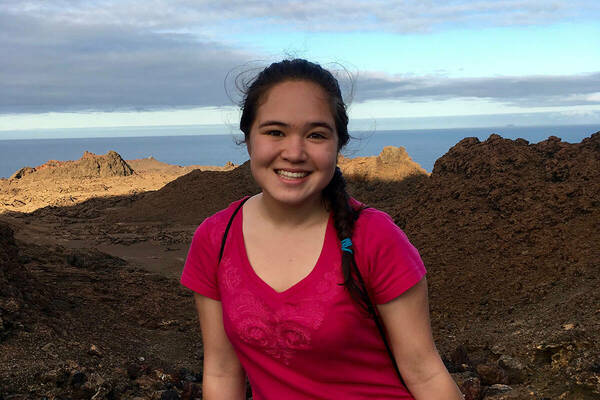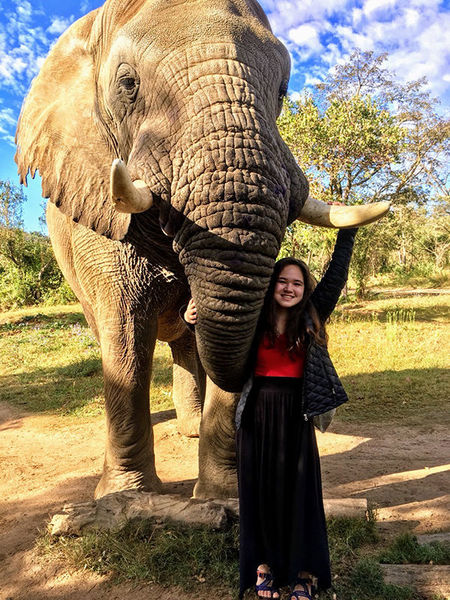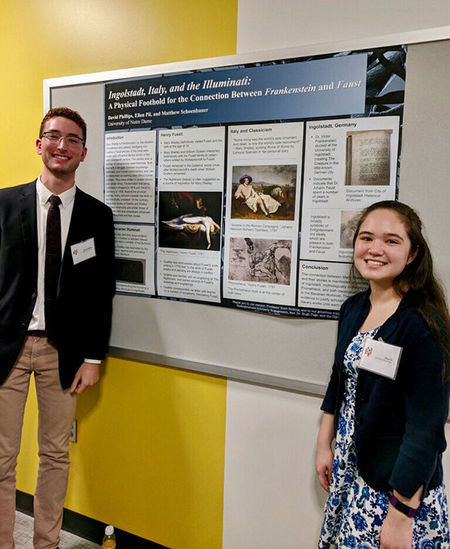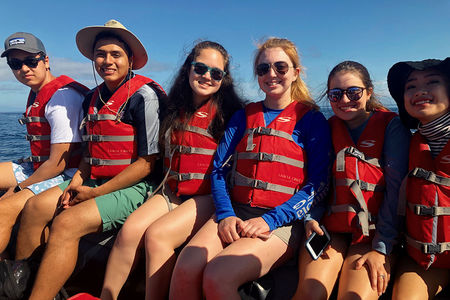
Junior Ellen Pil isn’t interested in narrowing down her interests.
A political science and Arts and Letters pre-health major, she is passionate about public policy, global health, and emergency medicine, along with research, service, and Gothic literature.
And in the College of Arts and Letters, she’s found the space — and the support — to explore them all.
“At Notre Dame, I’m not just allowed, I’m encouraged to pursue all of my passions,” Pil said. “I love the fact that no one here has said, ‘you should really narrow that down.’ They’ve said, ‘you have the time, the space, and the motivation to do it. Go for it.’”
And she has.
In less than three years, she has conducted research in Germany, traveled to the Galápagos Islands, worked for a nongovernmental organization in South Africa, and interned with a nonprofit health center in Chicago.
A Hesburgh-Yusko Scholar and a member of the Glynn Family Honors Program, Pil said she is amazed by the support she’s received in identifying opportunities and funding to cultivate her interests and discover intersections between her fields of study.
“Notre Dame has given me experiences that I wouldn’t find anywhere else,” she said.
 Pil in South Africa
Pil in South Africa
A time for discernment
Pil, who plans to attend medical school after graduation, is particularly interested in the intersection of health care and public policy — an area where her majors complement each other well.
“As a physician, you have a responsibility to advocate for your patients, especially those who can’t speak for themselves,” she said, “and my political science background has taught me to do that.”
The summer after her first year, Pil worked with an NGO in Hamakuya, South Africa, to help bring malaria education to rural communities. Her first experience with global health taught her a lot about what she wants — and doesn’t want — in her future career.
“I saw firsthand the impact of social determinants of health. For example, many people couldn’t read, so they weren’t able to understand informational public health brochures,” Pil said. “Talking to villagers about malaria prevention was rewarding, but I also realized that an education-only focus was not the best fit for me."
The opportunity for that kind of discernment is invaluable, Pil said.
“It is just as important to learn what you don’t want to do,” she said. “And these experiences have been very formative for me in teaching me about how I want to serve my community, my country, and the world.”
“As a physician, you have a responsibility to advocate for your patients, especially those who can’t speak for themselves, and my political science background has taught me to do that.”
Games and government
On campus, Pil has found a different way to be involved in global health — as a research assistant with Tamara Kay, an associate professor of sociology and global affairs. She is part of a team studying Project ECHO — a health care provider tele-mentoring program launched at the University of New Mexico, designed to improve global access to specialized health care.
“It’s been very helpful to see a different side of medicine and see how we can bring in technology and innovation,” said Pil, who is also a Kellogg International Scholar. “The impact Project ECHO has had is amazing.”
In her first year, she also began volunteering with the emergency medical services team at home football games. After earning her EMT certification during her sophomore year, she now serves as a lead coordinator.
And this summer, Pil interned in government relations at Hamdard Healthcare, a nonprofit organization in Chicago, which provides care to underserved communities.
 Pil presenting her research at the ACC Meeting of the Minds Conference in Louisville, Kentucky
Pil presenting her research at the ACC Meeting of the Minds Conference in Louisville, Kentucky
“Because it’s a nonprofit, I had the chance to do a lot of different things,” Pil said. “On day three, I met with the governor of Illinois. But I also spent a morning every week with the providers in the clinic. And that really helped me to ground my political work in how it would affect patients’ lives.”
Around the world
While Pil appreciates the chance to work and research at the intersection of her majors, she also appreciates the breadth of her Arts and Letters coursework — and the chance to explore interests outside of her career goals.
In her first year, she studied Gothic literature in a University seminar and ended up traveling to Germany with two fellow students to complete an independent research project on the parallels in Faust and Frankenstein. Their research has since been presented at three different conferences, including the ACC Meeting of the Minds Conference in Louisville, Kentucky, this spring.
She also received funding to travel to the Galápagos Islands for a week this summer to explore the foundations of evolution — an experience that came simply through opening an email from Notre Dame International, clicking a link, and filling out an application.
“There are so many opportunities available at Notre Dame — so if you see something that interests you, reach out for it,” she said. “Talk to your professors, ask the questions, send in the application, find those mentors — because they’re out there and they want to help.”
“There are so many opportunities available at Notre Dame — so if you see something that interests you, reach out for it. Talk to your professors, ask the questions, send in the application, find those mentors — because they’re out there and they want to help.”
 Pil (third from left) with fellow Notre Dame students in the Galapagos Islands
Pil (third from left) with fellow Notre Dame students in the Galapagos Islands
More to do
Looking ahead, Pil is excited to spend next semester in Washington, D.C., through the Notre Dame Washington Program, and to begin research for her senior thesis on the relationship between state-level public policy and the opioid epidemic in the United States.
All of these experiences are an integral part of her liberal arts education, Pil said — and will ultimately make her a better physician.
“A liberal arts education helps you to see your patients as more than just a statistic or a vital sign or a lab result,” she said. “Those numbers are important, but it’s also important for doctors to remember that their patients are people who are so much more complex than the basic sciences could ever tell you.
“Having the communication, empathy, and critical thinking skills we gain in Arts and Letters allows us to put our patients at ease and to better understand them and how we can help them reach their goals.”
“A liberal arts education helps you to see your patients as more than just a statistic or a vital sign or a lab result. Those numbers are important, but it’s also important for doctors to remember that their patients are people who are so much more complex than the basic sciences could ever tell you.”
Originally published by at al.nd.edu on November 12, 2019.